Note
Interesting and helpful thoughts; thanks for taking the time to type them!
My curiosity keeps knocking, so I've gotta pull the thread. Why would you erase Joker from existence if you could?
I'll break it down:
1. The Joker has no point.
There is not one consistent message in The Joker. It's not trying to "say" anything at all, because it commits to nothing. Instead, it almost says several things. It almost comments on the haves versus the have-nots. It almost comments on mental illness. It almost comments on society's treatment of those with mental illnesses. It almost comments on the government's spending. It almost comments on violence and comedy. But everything it tries to comment on feels like a sentence that gets cut off at the halfway point; after telling you the bad news and promising good news, it fails to deliver.
I'll tell you how it does this. Arthur Fleck is introduced as mentally ill. (As in, there was a developmental problem with his brain chemistry that causes him to miss social cues and laugh nervously.) This means that when he is mistreated by background characters for "being different," the audience should start to feel sorry for him and consider how a mentally ill person should be treated. But wait. He's not actually mentally ill because of a diagnosable problem with his brain chemistry—he claims he feels clearer and better when he's off his meds. Add that to the revelation that he wasn't born with a brain-chemistry issue. He was abused by his mom's ex. So, maybe he's not actually "crazy." Maybe, he's seeing the world as it really is? After all, it's been dark and terrible for him since he was a child. Or no, because what about that laughing tick, that's not normal, right? And he's hallucinating a life with a girl he's attracted to, and believes it enough to walk into her apartment like that's normal. So is he crazy, or just the only one responding correctly to a world as dark as he is?
The movie won't tell you. It starts a sentence, then cuts off before any thought or truth statement can be completed.
The movie also sets itself up as if those who have should be taking responsibility for society's "have-nots." Or it starts to. Mr. Wayne is introduced as directly responsible for the hardship Mrs. Fleck has fallen into. He is Arthur's father, and should be caring for him. But instead, he beats up and ignores the guy most entitled to, and in need of, his help. Just like the way he ignores the poor people in his city, right? But wait. No. Maybe none of that is true. Maybe Mr. Wayne is entirely innocent of abandoning Arthur and his mother—this was all the delusion of a selfish drug-addicted woman, and the rumors she's spreading ultimately lead to the assassination, not only of Mr. Wayne's good character, but of his actual life. And his wife's. So is the character who has power and influence and badmouths the poor a portrayed in a negative light, or a positive light? Is this character a selfish rich person who cares nothing for those less fortunate than himself, or is he just one more guy who could've been good if others' cruelty (Mrs. Fleck's lies) hadn't pushed him "past the breaking point?" Does that justify his cruelty, if it's true?
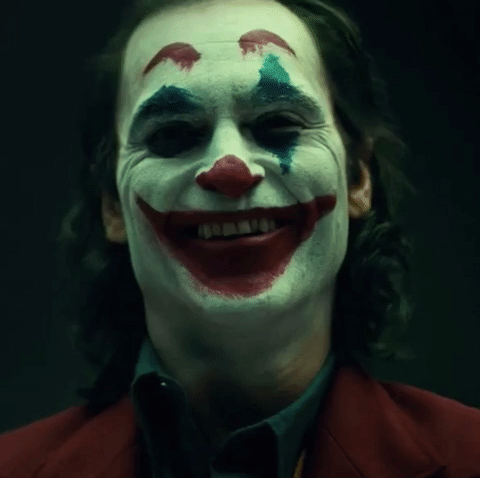
Both. Neither. Nothing at all. The movie won't tell you.
So you can pick whatever ending you want. But. No you can't. You can't even do that. Because guess what? It's all in Arthur Fleck, inmate of Arkham Asylum's, crazy head. Maybe none of it was real.
2. The Joker is therefore only successful as a piece of entertainment.
Everyone could've guessed that as soon as they saw it was a movie about the Joker. Nobody needed this movie in any sense. We already know more than one origin story for the Joker, as a character. We've already done-to-death every interpretation of his craziness. Everybody knows who he is and what he's like. So obviously, this was just going to be entertaining.
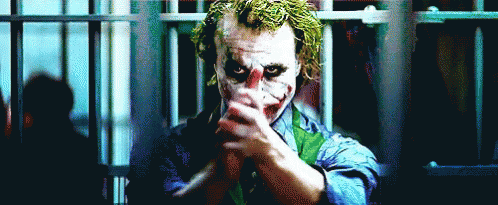
That's bad enough. Stories are supposed to remind you of goodness, beauty, and truth. Why? I'm not going to dissect it because everyone can read the pinned post on my blog. But because: the world's dark enough already, and it's easy to lose your sense of goodness, beauty, and truth. A story, even if it's a tragedy, even if it has no "happy ending," can still take you out of your present state of mind, sit you down in a fresh state of mind, and remind you of truth. Being "entertaining" is just one of the tools that the story uses to take you there. Or it's supposed to be.
When you take the point, the truth, the message, the "theme," out of a story, then it's just the Romans distracting the populace with coliseum spectacle so they forget that they're losing money and wasting their lives. Woohoo. "Fun. Entertainment."
You can disagree with me about that if you want. You can believe, like many I know, "it's fine to just turn off your brain and be entertained! Not everything has to mean something! I bet you're fun at parties!" Okay, cool, so you like being entertained, and The Joker entertained you.
The problem is, what were you being entertained by?
Because:
3. The Joker increases an appetite for evil in the audience.
I don't care. I said it. It's painfully obvious.
First of all, you came here to what? Watch the bad guy lose and the good guy win? No. This movie's got no Batman. You came to glut yourself on two hours of the bad guy with no pesky good guy to share his spotlight.
Is that too harsh? Maybe you just came in expecting the Joker to be about how a good man goes bad. Okay. Uplifting. But sure, maybe a cautionary tale could be useful.
But that's not what you get with the Joker. We already established: there's no lesson, no point, to this movie besides entertainment.
And I don't just mean "aw booo, there was way too much icky blood and scary suspenseful music. Oh no, a movie about a villain had villainy in it!!"
Nope.
I mean, tell me why Arthur Fleck only has moments of peace and transcendence after he murders someone? Why's the sunlight warming him up, like a benevolent gift from the heavens, in the shot after he smothers his mother with a pillow? Why are those somber strings playing out a ditty he can "be himself" and dance to after he shoots three young men? Why is he only experiencing clarity after he kills?
Why are the most "interesting" parts of Joaquin Phoenix's portrayal the parts where the character is killing, stealing, or thinking about killing?
Why is so much effort put into telling the story as if Arthur Fleck is sympathetic, no matter which way you look at it? He only kills mean people. Except his mother. Oh but she was kind of mean, too. Never mind that whatever caused her to ignore, lie, and abuse her son was also played off, in the movie, like a mental illness. The very thing we're meant to feel sorry for Arthur about.
The movie won't tell you who's right or wrong. But it makes you see everything through Arthur's eyes, with nobody to stop him or correct him or offer a differing point of view—and that alone is dangerous. Your mirror neurons are going to make you sympathize with that main character, regardless of how heinous his actions are, when the storytellers are so careful to offer you all these reasons why his actions were "justified."
The Joker was invented to have a Batman. Introduce a villain—even a sympathetic villain—but you have to also introduce the opposite of that villain. It can be one line of dialogue; it doesn't have to be a hero. But you have to say something about the evil when it is represented. Instead of inviting everyone to feel for the villain...then leaving them feeling vaguely satisfied when he commits atrocities. They can't help it. It's the first time he's looked at peace, or in control of anything. That's how the movie is made.
So you're entertained by looking for a statement that isn't there—or by watching one man brutally slay five people, one of whom is his mother, because you were just so excited to see some blood, to see a man snap. Panem et circuses. At its finest. And you paid for it. Smart. Cultured, of you.
I'd wipe that movie out of existence and force the writers and directors to stare at a wall while sad violin music plays in the background for exactly how many days it took them to make that movie, if I could.
#joker 2019#storytelling#ask#interesting#the joker#arthur fleck#movie#analysis#review#joker#artist-issues#me
49 notes
·
View notes
Note
List 5 things that make you happy, then put this in the askbox for the last 10 people who liked or reblogged something from you! Get to know your mutuals and followers <3
(you fall victim to this because you’re a mutual, so sorry but not really 🫵🏻💀)
I gladly accept the victimhood!
The rain. I love the rain, I think it's so cool!
Hugs, they improve everything
An uplifting piano and/or orchestral piece of music, especially if it's a cover of a song or soundtrack that I like
Seeing other people get happy or excited about stuff typically makes me smile too
The other meals are good too, but nothing beats a really nice lunch for me.
This was fun to think about, thank you!
3 notes
·
View notes
Note
Okay, so I’ve gotta know as someone who played the OG pixelated Final Fantasy game on Nintendo…what exactly got you into it???
In one word: Story
In more than one word: It started with Kingdom Hearts, really. I was one of the folk who saw those cool guys with anime hair in my Disney game and steadily wondered more and more what the deal with them was. Once I learned a bit more about the Final Fantasy series from that, I picked up more bits and pieces as I went.
I'd watch videos that cut together clips from some of the cool scenes in Advent Children, which led to me outright watching Advent Children with no context, which led to me reading wikipedia articles and the like that of course spoiled the magnificent story of Final Fantasy VII for my naive child mind. Not that I minded - I was still fascinated.
And by the time I got my first Final Fantasy game - Crisis Core on PSP, the prequel to VII, I'd more or less forgotten what little I knew by that point or at least still lacked all of the important context. But that game was so significant. I loved it and it set the ball rolling for my proper onslaught into the FF series. I played VII, I've started VI, VIII and X (and will finish them all...one day...), I watched a cutscene compilation of XIII and XIII-2 (I still don't really understand what I watched, but I liked the characters) and I've fully played through XV (sans DLC) and XVI (I'm...not sure anymore how much I like that one, to be honest).
Anyway, to get back to your question, all of this interest can be traced back to story. Honestly, while I like RPGs, super grind-y turn-based games need to do a lot to keep my attention and are a big part of the reason that there are so many unfinished or even unplayed FF games in that list. But in spite of the roadblocks of those gameplay issues, I've still ventured them and am still keen to keep venturing them (when I have the time) because they have stories (and the all-important characters that make the stories worthwhile) that I'm invested in.
I played Kingdom Hearts because I fell in love with the characters and story. I looked into Advent Children because the personal conflict between Cloud and Kadaj seemed to have a deeper story to it. I followed up on that film because Advent Children itself was the epilogue to another much grander story; incomplete without the story that preceeded it. I took a proper plunge into that story after the story of Crisis Core got me to fall in love with the world and characters and made me feel a desire to see where things went.
By this point I've made you hate reading the word 'story' I'm sure, and these experiences are largely centred on VII, but that's the source of my love of Final Fantasy. Every world, every plot and especially every cast of characters are the things that I'm drawn to these games for. It's fair to say that nobody quite makes stories like the ones in that series and I'm all the happier for it.
And it all starts when you see a really cool guy strut past you with a cool gauntlet, spikey hair, a tattered crimson cape, a bat wing and of course a giant heavy sword that he swings around with ease. You take one look at a guy like that and you know "Yeah...that guy has a story."
#final fantasy#final fantasy vii#ff#ff7#final fantasy vii advent children#ffvii advent children#ffvii#cloud strife#zack fair#ask#text#me#carolinetano7567#story
4 notes
·
View notes
Text
Sonic and Shadow are truly perfect juxtapositions of each other. Thinking about them in the game verse specifically:
Sonic is casual; Shadow is formal.
Sonic is simple; Shadow is complicated.
Sonic reacts; Shadow plans.
Sonic acts on instinct; Shadow thinks through his every move.
Sonic has always known who he is; Shadow has had to fight to know who he is
Sonic trusts himself; Shadow doesn’t.
Sonic doesn’t care about his past; Shadow is constantly fighting to not be consumed by his past.
Sonic doesn’t worry about whether or not he’s ‘good’; Shadow constantly doubts his own motivations and is very concerned about if he is good.
But Sonic and Shadow are also extremely similar in specific key ways:
They’re both introverts.
They both hate injustice.
They’re both compassionate.
They both have good intentions.
They’re both competitive
They’re both incredibly loyal to people they care about.
It’s through these similarities that they can bond and have a healthy respect for each other, and even be friends. And even with their differences, I think they admire each other. Shadow admires Sonic’s unwavering confidence and certainty, and Sonic admires Shadow’s strength in the face of everything he’s gone through.
Their dynamic just fascinates me.
EDIT: Do not tag as ship. Thank you.
#shadow the hedgehog#sonic the hedgehog#characters#analysis#comparison#interesting#cool#shannonallaround
659 notes
·
View notes
Text
I’m so enjoying the whole “Harry Potter is good but whenever the Marauders pop in I feel like I could be reading an even better story” vibe, that I go into the tags to search and see Marauders fan stuff, and what are you guys doing?
…I mean I know I’m like 28 years late to the party, but what? Was Harry Potter like…the first fandom that ever just went insane and completely ignored what the characters in the canon material were actually like, so that they could make self-satisfying headcanons and slap the names “Lupin, James, Sirius,” on top?
Is this where the “yeah I really love this carefully-created, artfully-portrayed teenage boy character, so I’m naturally going to prove that love by oh completely re-writing his personality and interpersonal relationships in my own headcanon.” came from? From the Marauders and Harry Potter?
I mean jeez, where are you getting some of this stuff? I’m no expert. I know I just started reading these. But Rowling’s characterizations seem pretty straightforward, so when I look at the most prominent fan-accepted headcanons, it’s hard not to be like…Did you read these? Are we reading about the same characters, because this character in this book does not match with your webcomic. Is this the same character? Do you even like them?
#THANK YOU#The amount of times I've seen this happen#So many people clearly want to write their own stories and don't know it#fandom#harry potter#hp#mauraders#analysis#interesting#argument#artist-issues#writing#rewriting#canon#characters
54 notes
·
View notes
Text
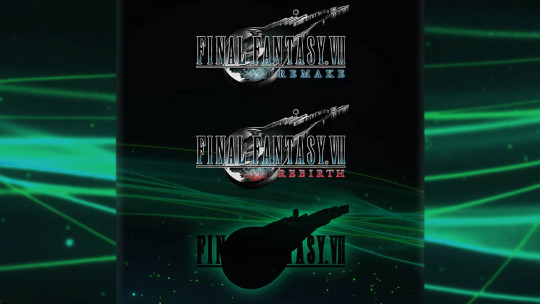
Alright FFVII fans (and other willing volunteers), enough dancing around it! With a month to go until Rebirth comes out, it's time to discuss the title of the third game in this trilogy!
We already have Remake and Rebirth of course, plus the Crisis Core Reunion prequel and the Retrograde DLC (or was it Remission? (EDIT: it's Intergrade and Intermission. I'm an idiot, of course)), so we all see the pattern, don't we? Thus, I shall wager that the final game in this saga shall be one of THESE WORDS:
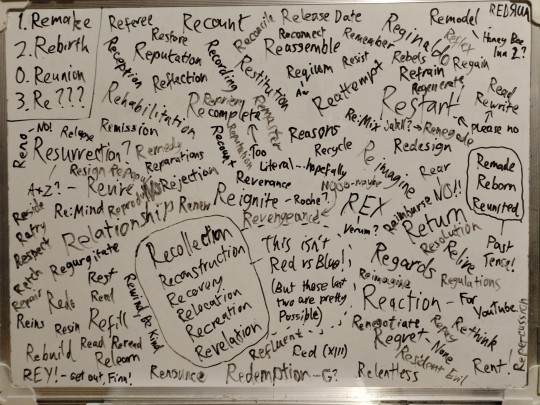
I'm not exactly a prankster, so while I know I'm putting my life in the hands of the internet here, I am willing to accept suggestions on some kind of forfeit if the third game doesn't have one of these titles. Purely for fun, but why not? I figure my odds are pretty goo-OH, RECONFIGURE, DARN IT!
So yeah, place your bets, cast your votes and throw in your ideas! What do you think will be the name of the final game of the FFVII remake trilogy?
#ff#ffvii#VII#final fantasy vii#remake#fun#trilogy#rebirth#reunion#square enix#ffviir#game#title#conspiracy theories#guessing game#reno#red xiii#text#image#crisis core#retrograde#remission
16 notes
·
View notes
Text
The more I see “deleted scenes” and fan-made rewrites, the more I think Wish’s main problem was forcing the movie to be about making your own wishes come true. Everything’s tied to this idea that it’s a story “about wishes.” But that’s silly. You can’t base a movie on those two words. What about wishes?
“Be careful what you wish for?” That’s a movie idea. The main character can wish for something she thinks will make her life better, but because she never understood that thing she wanted, it turns out to be a terrible fit for her life.
“Wishes can come true if you’re ___?” That’s a movie idea. Fill in the blank with an attribute you want to highlight: brave, selfless, willing to work hard, or of course, faithful.
“Wishing makes life worth living?” That’s a movie idea. Like Hadestown or Mary Poppins; maybe the main character learns that even when circumstances are beyond her control, seeing the world as it could be makes those circumstances light and easy.
But just… “it’s about wishes?” That vibe, where the wishes have to be tangible things, bubbles, ribbons tied to trees, etc…. and those tangible things are the driving force of the plot? That doesn’t make for a good story.
Wishes are only useful in a story, at all, because “wish” is just a fancy term for “what a character wants and can’t reach on their own.” So if you make a movie that’s “about wishes,” but all the characters are trying to do is “protect the desire for something more that can’t be reached,” you have a really flat and hollow movie. One that actually makes the wishes themselves boring. Which…is horrible because what you just did there was not only make magical flowing endangered bubbles boring. You made every character’s main motivation boring.
A good story would have been just that: a story. A character who wants something they can’t reach alone, who overcomes obstacles or makes flawed decisions to reach what they’re unable to get. And then has to learn the lesson they needed to learn in the first place.
The wish itself should just be sort of calmly featured in the background: like Princess and the Frog. Is Tiana wishing for her restaurant? Yes. But is the restaurant, or her act of saying words to the stars about the restaurant, the focus of the movie? No, it’s just a normal “idea or dream the character has.” It’s much more powerful there.
‘’If it ain’t broke, do not let me catch you trying to fix it.
#wish#disney#analysis#criticism#storytelling#interesting#princess and the frog#tiana#text#artist-issues
86 notes
·
View notes
Text
I Hate How She Talks About Snow White

"People are making these jokes about ours being the PC Snow White, where it's like, yeah, it is − because it needed that. It's an 85-year-old cartoon, and our version is a refreshing story about a young woman who has a function beyond 'Someday My Prince Will Come. "
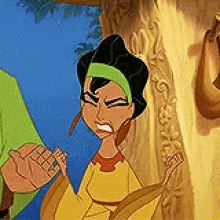
Let me tell you a little something's about that "85-year-old cartoon," miss Zegler.
It was the first-ever cel-animated feature-length full-color film. Ever. Ever. EVER. I'm worried that you're not hearing me. This movie was Disney inventing the modern animated film. Spirited Away, Into the Spider-Verse, Tangled, you don't get to have any of these without Snow White and the Seven Dwarfs (1937.)
Speaking of what you wouldn't get without this movie, it includes anime as a genre. Not just in technique (because again, nobody animated more than shorts before this movie) but in style and story. Anime, as it is now, wouldn't exist without Osamu Tezuka, "The God of Manga," who wouldn't have pioneered anime storytelling in the 1940s without having watched and learned from Snow White and the Seven Dwarfs in the 1930s. No "weeb" culture, no Princess Mononoke, no DragonBall Z, no My Hero Academia, no Demonslayer, and no Naruto without this "85-year-old cartoon."
It was praised, not just for its technical marvels, not just for its synchronized craft of sound and action, but primarily and enduringly because people felt like the characters were real. They felt more like they were watching something true to life than they did watching silent, live-action films with real actors and actresses. They couldn't believe that an animated character could make kids wet their pants as she flees, frightened, through the forest, or grown adults cry with grieving Dwarves. Consistently.
Walt Disney Studios was built on this movie. No no; you're not understanding me. Literally, the studio in Burbank, out of which has come legends of this craft of animated filmmaking, was literally built on the incredible, odds-defying, record-breaking profits of just Snow White and the Seven Dwarfs, specifically.
Speaking of record-breaking profits, this movie is the highest-grossing animated film in history. Still. TO THIS DAY. And it was made during the Great Depression.
In fact, it made four times as much money than any other film, in any other genre, released during that time period. It was actually THE highest-grossing film of all time, in any genre, until nothing less than Gone With the Wind, herself, came along to take the throne.
It was the first-ever animated movie to be selected for the National Film Registry. Actually, it was one of the first movies, period, to ever go into the registry at all. You know what else is in the NFR? The original West Side Story, the remake of which is responsible for Rachel Ziegler's widespread fame.
Walt Disney sacrificed for this movie to be invented. Literally, he took out a mortgage on his house and screened the movie to banks for loans to finish paying for it, because everyone from the media to his own wife and brother told him he was crazy to make this movie. And you want to tell me it's just an 85-year-old cartoon that needs the most meaningless of updates, with your tender 8 years in the business?
Speaking of sacrifice, this movie employed over 750 people, and they worked immeasurable hours of overtime, and invented--literally invented--so many new techniques that are still used in filmmaking today, that Walt Disney, in a move that NO OTHER STUDIO IN HOLLYWOOD was doing in the 30's, put this in the opening credits: "My sincere appreciation to the members of my staff whose loyalty and creative endeavor made possible this production." Not the end credits, like movies love to do today as a virtue-signal. The opening credits.
It's legacy endures. Your little "85-year-old cartoon" sold more than 1 million DVD copies upon re-release. Just on its first day. The Beatles quoted Snow White in one of their songs. Legacy directors call it "the greatest film ever made." Everything from Rolling Stones to the American Film Institute call this move one of the most influential masterpieces of our culture.
This movie doesn't need anything from anybody. This movie is a cultural juggernaut for America. It's a staple in the art of filmmaking--and art, in general. It is the foundation of the Walt Disney Company, of modern children's media in the West, and of modern adaptations of classical fairy tales in the West.
When you think only in the base, low, mean terms of "race" and "progressivism" you start taking things that are actually worlds-away from being in your league to judge, and you relegate them to silly ignorant phrases like "85-year-old cartoon" to explain why what you're doing is somehow better.
Sit down and be humble. Who the heck are you?
#snow white#analysis#rachel zegler#disney#animation#storytelling#interesting#text#snow white and the seven dwarves
5K notes
·
View notes
Text
Watched this video a couple of times, thought it through piece by piece, and I'm sorry but I thoroughly disagree with Tyr here.
Love is putting others before yourself. Tyr is phrasing it nicely, but he's basically suggesting to Mimir that real love is actually the exact reverse of that.
The "better person" that Mimir became through loving another that he viewed as more virtuous and admirable than himself, someone who loved him in turn, the idea that this better person was "inside him all along" and love simply made him aware of that rather than inspiring him to change into that person, I think that idea is a pointless distinction at best and a harmful absolvement of accountability at worst. Whether meaning to or not, Tyr suggests that the actions of Mimir's past that he's ashamed of do not define his character simply because he hadn't recognised his potential yet.
True, the past doesn't dictate who you choose to be now, but that's not what's being suggested by saying "you were always better". Like, if I remember right, Mimir earlier talks about meddling with the love life of a princess on behalf of a selfish ruler, something that he was only too glad to do in his youth. Imagine you met that princess. Which would you say? "I'm sorry Mimir did that to you, but know that he fell in love with a Valkyrie later in life and changed for the better." Or: "I'm sorry Mimir did that to you, but know that he was actually a good person deep down, he just didn't know it until he fell in love later in life." Which one do you think would more likely offend the princess?
At the end of the day, Mimir changed. To redefine the way he changed in perspective is of negligible difference to those he wronged. That's assuming the change in perspective doesn't entirely suggest his innocence of wrongdoing in the first place due effectively to not having met the right person.
As for the second part: "As though love is the feeling of recognising the potential in our own soul" is a sentence that redefines love from something selfless into something selfish. Yes, Tyr backtracks a little shortly after saying this, he ends on the note that his endgoal with this line of thinking is to love others better and what he suggests in concept about recognising our potential to be better is good. But the bottom line is that what he's describing is not love.
What Tyr is reaching for is this idea that love is some kind of process of: Witness good qualities -> Introspection -> Recognise same qualities in self -> Embody good qualities. That looking at someone we admire is looking at a mirror, not a pedestal, not a symbol and not even just another person. He makes it sound nice, but I don't think it's a good way to think about love. Mimir's suggestion that this line of thinking makes falling in love all about ourselves isn't that far off.
I think that process isn't too dissimilar from what happened to Mimir, but love is about the sacrifice of self - not the focus on self. Any introspection, any embodiment of good qualities and any very real change in behaviour, attitude, action and values on Mimir's part were not the feeling of love itself but the natural consequences of it. He was motivated by love to be better, that doesn't make the focus of self an act of love in the process.
What is an act of love is that he recognised the people (even just one person) around him as worth changing for. Worth improving himself for. Worth being good for, whatever the cost to himself. He didn't do that because he saw "himself for the good person he truly is" or whatever (to borrow a phrase from Mimir) 'pure havers' that was. He did it because he saw someone greater than himself who served a purpose greater than herself and he wanted to be like that.
Mimir's love wasn't about himself and I don't think it's a good thing to suggest it was. It was about Sigrun and it couldn't be better for it.
Sorry for the sudden GOW rant. My thoughts on the "Love Redeems" theme of these recent games are deep well that may at times become a geyser.
Just thought it was a beautiful sentiment from Tyr on his understanding of what love truly is
#feel free to disagree if you have a counterargument!#this subject interests me#still please respect my point of view#god of war#god of war valhalla#god of war ragnarok#mimir#tyr#sigrun#love#essay#rant#ramble#analysis#gow#god of war valhalla spoilers#video#reply#me#text
24 notes
·
View notes
Text
Aww, this was so good! Thanks so much for making this! The little lighthouse lesson from Mr H was a brilliant touch!
My @twewysecretsanta gift fic for @voicefromthecorner
Prompt: Neku, during his 3 years in Shinjuku, reaches a low point of loneliness and imagines a meeting with his friends to help him get through it. Even Joshua and Mr. H are there. Each one inspires him in a different but valuable way, and he ends the imagined spot with strengthened resolve.
If you had told Neku he would end up spending an ungodly amount of time in the dilapidated ruins of what was once Shinjuku, he would’ve told them off for telling such a terrible joke.
Unfortunately, it was reality, leaving him completely alone save for the lingering scattered thoughts of those who once called Shinjuku home. They weren’t exactly the best at conversation (he’d tried), and while there was Coco, her appearances and length of stay were unpredictable. It was ironic really; before the first time he find himself in the UG, being isolated and left alone was exactly what he wanted – now he wanted anything but.
He had his phone, which by some miracle of the UG the battery never died, but also being in the UG meant he couldn’t use anything save the camera and notes. Not that he hadn’t tried texting his friends in a vain hope the broken Shinjuku would allow him to bend the rules to get something out.
But it didn’t work.
Every message he tried to send simply sat there, mocking him with ‘message failed to send. Try again?’
He knew he was beginning to lose it when he tried playing tin pin slammer against himself.
/
Neku was leaning against one of the invisible walls acting as the boundary of where Shinjuku ended, absently staring at the date on his phone: December 25. It mocked him mercilessly; a stark reminder of how long he’d been stuck in this hell, of not being with his friends. Beat would have told Rhyme and Shiki what happened, but it had been so long, and Neku hadn’t come back – did they know he hadn’t been erased? Or were they left thinking he was gone for good?
He leaned his head back, closing his eyes. Regardless of what they knew, he hoped they managed to find some way to celebrate the holidays. Shiki probably made a Santa outfit for her piggy, and spent the day with Eri before meeting up with Beat and Rhyme. They’d met at Hachiko, with the brother and sister duo wearing matching Santa hats; Beat having decked out his skateboard in lights. Shiki would try to convince Neku to join in on the festive dress up, eventually getting him wear a pair of reindeer antlers to go with Mr. Mew. They’d exchange gifts perhaps, before heading to WildKat. It would be the perfect end to the day…if he wasn’t stuck in limbo.
It wasn’t fair.
Neku stood up abruptly, banging his fist on the wall. It shimmered, but refused to break. “I shouldn’t be here!” He yelled, not letting up on the wall. “You hear me?! I should be out there, not here! I didn’t ask for this!”
He'd survived the Reaper’s Game, found friends and actually started to finally enjoy life – but in the blink of an eye it was cruelly snatched away from him. What had he done so wrong that he deserved this? Why couldn’t he just be left to hell alone to just be able to live his life?!
“IT’S NOT FAIR!” He screamed, hitting the wall as hard as could. It remained stubbornly unchanged, laughing at him. He rested his forehead against the cool surface, his throat tight and his eyes stinging. “I did my time…just let me out, please…even if I have to play the game one more time, I don’t care…”
A laugh from somewhere behind. An annoying, all too familiar laugh. “Aw, c’mon Neku, I didn’t think you were the type to give up so easy.”
“You think this is easy?!” Neku spun around, ready to give the composer hell –
But there was no one there.
“Josh…?” He looked around, but there was no sign of the blonde.
The laugh came again from the remains of a nearby alley, and he took off after it.
“Show yourself already! This isn’t funny!”
He didn’t find Joshua, instead reaching a dead end with a mural that had managed to stay miraculously intact: a ship struggling upon a stormy sea, with a bright lighthouse just barely peaking out over the waves.
“There’s a good message there, if you pay attention.”
Neku frowned, slowly turning around to this time, to find Mr. H standing a handful of feet away. “And what message would that be?” Neku asked bitterly. “That everything you want is will always be out of reach?”
Hanekoma chuckled, shaking his head. “No, take a closer look. That ship is close to the lighthouse, but can’t see it. It would be a real shame to give up now when they’re so close.”
“What are you talking –” Neku looked back to the mural, and back to Hanekoma, only for the producer to be gone.
Neku sighed deeply, letting himself slide down the wall. Was he seeing things, or had Joshua and Mr. H actually been here? He supposed it didn’t really matter, since they were gone now. Although…he looked up at the mural above him, the angle hiding the lighthouse entirely. He knew it was there from before, but from here was clear the crew on the ship didn’t. Mr. H had a point; if they gave up now and sunk into the water it be a tragedy. They were so close to safety, and yet they never made it.
…Mr. H never pointed anything out without reason, could it be his own lighthouse was just out of view? Could he dare hope for that possibility?
“Yo phones! What you doing thinking so hard? You’ll get lost in there!” Neku looked up, to where Beat and Rhyme were standing where Mr. H used to be. “You just leave all the heavy stuff to me, and everything will be okay, aight?”
“You didn’t give up on us, and we won’t give up on you. We’ll be waiting for you.” Rhyme chimed in with a smile.
“Hey, Neku? You remember back in the reapers game, when I told you about my entry fee?” Shiki was standing in front of him, fidgeting with Mr. Mew. “You believed in me then, gave me the confidence to be okay with my own appearance.” She held out a hand. “Well, I believe in you too. I know you’ll find you’re way back to us.”
Neku reached out and took the hand, a small smile making its way onto his face. “Thanks, guys. I’ll see you at Hachiko.”
The next moment he was standing, and while he couldn’t see the others anymore, he could still feel them; their presence a warmth chasing the loneliness away. Shinjuku wasn’t exactly a small city – it was more than likely he hadn’t explored it completely, and next time he saw Coco he’d get her to help search.
He would reach his lighthouse, to where his friends were waiting.
#TWEWYWinterSecretSanta2023#neo twewy spoilers#ntwewy#the world ends with you#twewy#neo the world ends with you#neku sakuraba#shiki misaki#beat bito#rhyme bito#joshua kiryu#sanae hanekoma#story#text#ghostofchaosyettocome#secret santa
5 notes
·
View notes
Note
"I'm a Christian guy with better things to do, but I'm not doing them right now."
Mood.
Amen.
3 notes
·
View notes
Note
Something I've been wondering for a while is, what is your take on retcons? Or serialized stories where the authors change their minds partway through, causing words that meant one thing when it was published to now mean another?
For instance, a LOT of A New Hope is very different now after Empire, the Prequels, and even Rogue One.
Should we differentiate between how the story would have originally been interpreted vs the new context, or just say the story's meaning in light of what it is now?
...I think it depends on how much sense it makes toward the serialized story's main point.
Because with a serialized story, the whole idea is that part 1 is just part 1--the creator's not done saying what they had to say, so there's technically still time for changes--but it has to be within reason. And that reason is determined by how much has already been said and what the main point of the story as a whole is.
For example:
George Lucas already said "Luke Skywalker's father was killed by evil, and his character flaw is looking out at what could be and trying to rush to control the outcome; he needs to learn faith." In A New Hope.
But he wasn't technically finished telling the story because Luke comes back in An Empire Strikes Back. So George Lucas' retcon, that Luke's father is actually still alive, is fine--because it works within the boundaries and natural progression of what's already been said. "Luke's father's killed by evil and he needs to learn faith = Luke's father's old SELF was killed by evil, and getting blindsided by the fact that he's still alive will help Luke learn faith." Natural progression.
What I mean by "retcon" is "storyteller started to say something, then doubled back and decided to say it a different way."
They're not changing what the story is meant to communicate; they're just shifting some words around to say it more clearly. I think of good remakes the same way.
But!
If a storyteller starts to say something, then doubles back and changes the words they're using to communicate (changing who the character is, how they intentionally responded to a given situation, etc.) so that the thing the story was meant to communicate in the first place is DIFFERENT, and the changes CONTRADICT what's already been said because of that--
--then it's bad.
So.
Luke learning in ESB that his father wasn't killed by evil like ANH said, but is evil, which makes his need for faith-over-fear greater? Good retcon.
Rey learning that her parents weren't "nobodies" like TLJ said, but actually they were related to somebody important like TROS said, which changes her previously-established need to stop thinking so much about herself and just do what she can humbly? BAD retcon.
Ruined her character arc. Weakened the main point of the story. It was a retcon that basically did the storyteller's equivalent to this communication blunder:
Beginning of Sentence: "The happy dog jumped--"
End of Sentence: "The happy dog jumped flat on his back because he was sad."
That's as clear as I can make it 😅 Does that answer your question?
#I agree with all of this#retcons have always annoyed me#in like every conceivable way#this makes good sense of them#retcon#retcons#writing#advice#helpful#analysis#text#star wars#sw#rey#luke skywalker#darth vader#oh man rey's character arc thing was so annoying#I'm still mad about RoS#A New Hope#Empire Strikes Back#The Last Jedi#Rise of Skywalker#artist-issues
15 notes
·
View notes
Text
Daffy Minamimoto
A while back I made a post of some of my favourite Daffy Duck lines from The Looney Tunes Show. I don't know how, but it hit me that a lot of his lines might work pretty well coming from our favourite number cruncher:
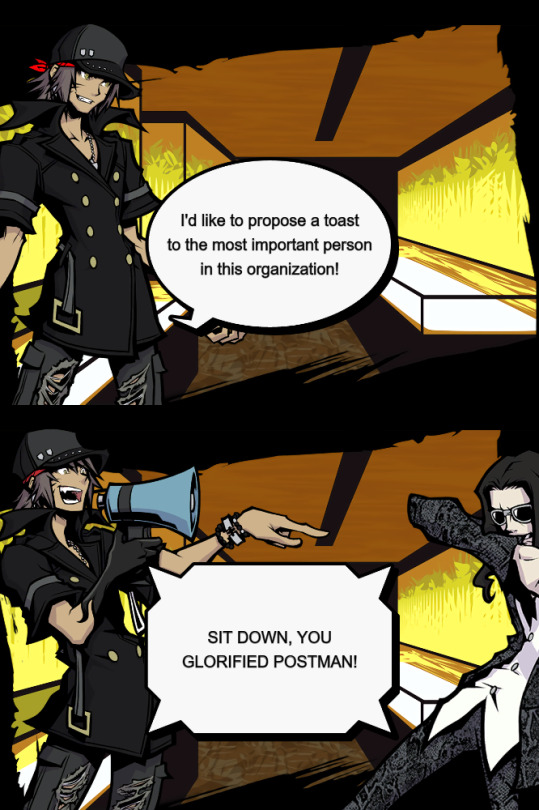
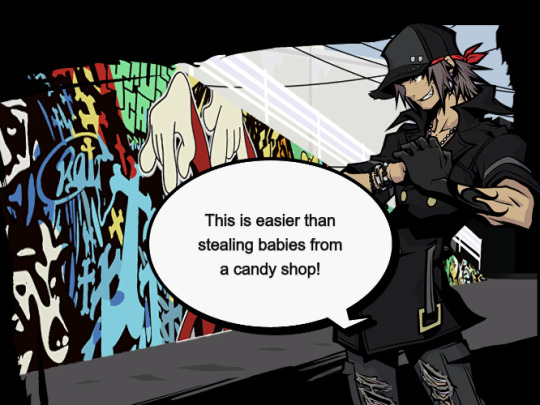
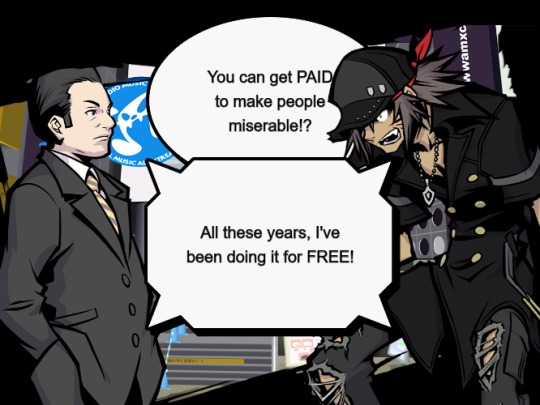



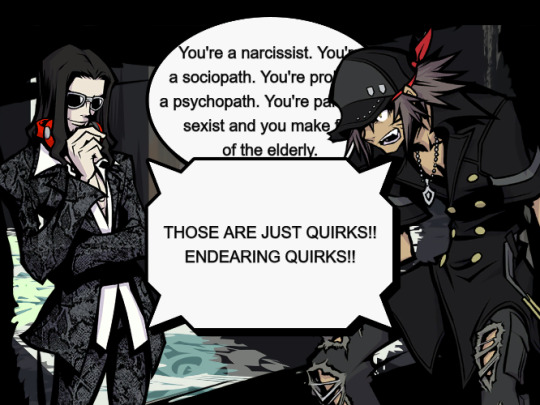
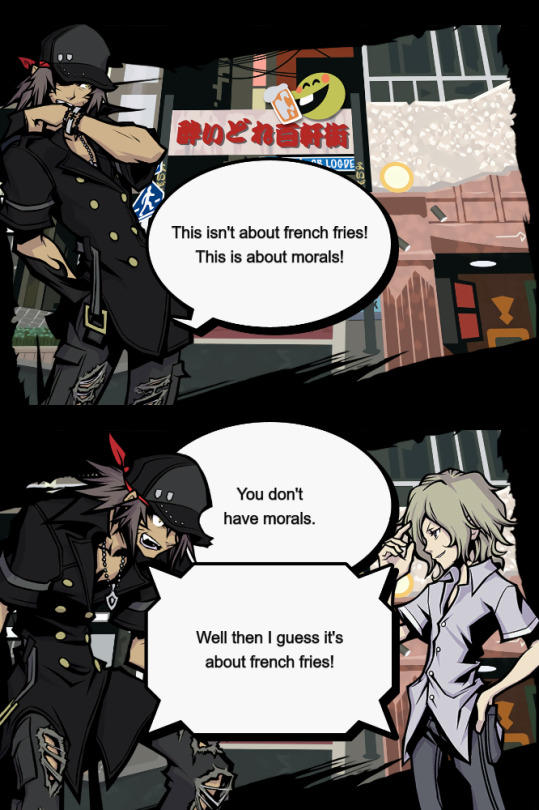
Made using eLTehh's TWEWY Message Generator.
#twewy#the world ends with you#sho minamimoto#edit#daffy duck#incorrect quotes#source: the looney tunes show#joshua kiryu#neku sakuraba#koki kariya#megumi kitaniji#coco atarashi#twewy boss#fun#funny#eltehh
68 notes
·
View notes
Text
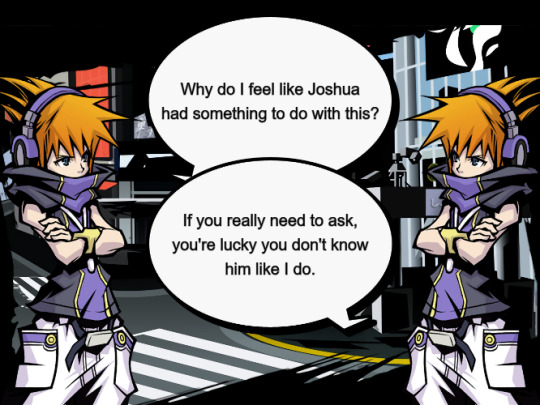
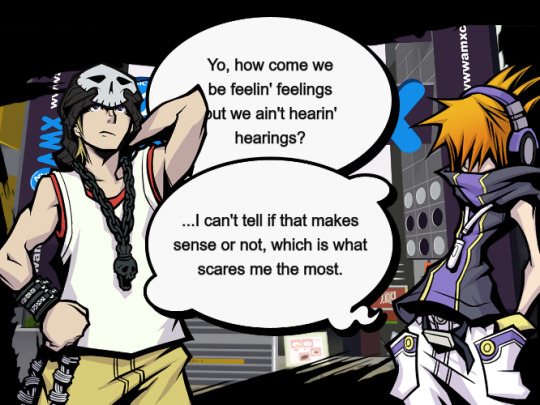


This is so cool! Here's some quick results of me playing around with it. More to follow.
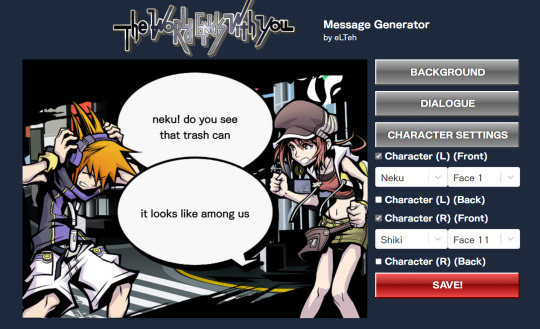
working on a new webdev coding project...
edit: not everything is implemented yet, but here's a link if you want to give it a try :) TWEWY Message Generator (eltehh.github.io)
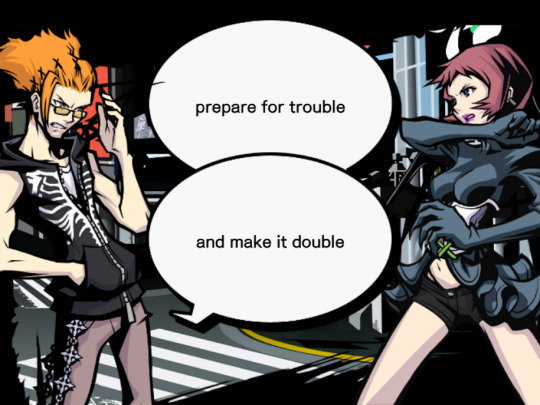
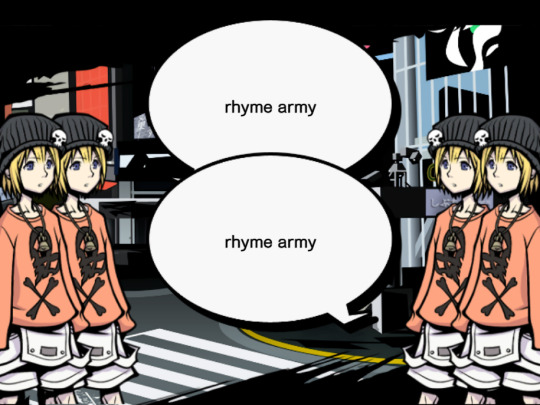
#eltehh#twewy#the world ends with you#generator#edit#fun#neku sakuraba#joshua kiryu#shiki misaki#beat bito#twewy beat#funny#link#useful
373 notes
·
View notes
Text
if you dont fit either category reblog so it can reach the people who do. please i need to know
136 notes
·
View notes
Text
Rhyme: You think you're making progress and then you hit a wall.
Neku: Break it down.
Shiki: You're starting to sound like Beat.
Neku: Never mind.
Beat: It's a good plan!
#awesome#twewy#the world ends with you#neku sakuraba#shiki misaki#beat bito#twewy beat#rhyme bito#twewy rhyme#edit#image#chat#funny#source: ffvii remake#dehliadelights#cool#useful#generator
41 notes
·
View notes
Text
Because a concerned commenter recently tried to help me, I want to say something real quick. I talk a lot about what I believe good storytellers should do, and how to discern good stories when you're an audience member.
But because of the concerned commenter, I want to also point out what I've only hinted at in posts like this one: An audience member has to engage genuinely and in good faith with the story, before they decide if it's good or bad.
You have to say "I'm taking the storyteller at their word, where they're at, and I'm sitting back for the ride" before you criticize it.
It's like "innocent until proven guilty." And I've talked about that being the problem with big fandoms like Star Waes (or just fandom in general.) You're not being a good audience, or a good critic, if you walk into the story with preconceived expectations. You wouldn't be a good listener if you did that with every conversation; storytelling is communication.
First, eat it. Then if it tastes bad, spit it out, and say "now what, exactly, made me hate that?" Or if it tastes good, it's just as important to say, "now what, exactly, was so enjoyable about that?" But first, before you can accurately do any of that, you have to go all in, trust it enough to take it in, and eat it.
If you walk in looking for something to hate you'll find it. If you walk in looking for something to love, you'll find it. Whether it's the point or not. And it's much harder to work backwards and "think critically" from there, because you didn't start out very objective. That's what nitpicking is.
It's why I can say, "Barbie is a really good movie. But its morals are terrible." Because I let myself enjoy what I enjoyed and hate what I hated, first, naturally, just as a regular popcorn-eating audience member. (You guys know I don't like Greta Gerwig, so it was a struggle, but she's such a good storyteller that it wasn't that big a struggle.)
You have to be a good audience member, who listens in good faith, before you can be any kind of accurate critic, or, more importantly, a discerning person.
#writing#art#Barbie 2023#media#criticism#analysis#useful#interesting#text#artist-issues#this post puts so well into words an issue that often nettles me
38 notes
·
View notes